Movies - New Releases
Select an movie thumbnail to read the review.






Our Favorite in Movies
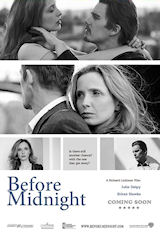
Movie: Before Midnight
Director: Richard Linklater
Genre: Drama, Romance, Comedy
Rating/Duration: Unrated, 1 hr. 48 min.
'Before Midnight' Review: Richard Linklater, Julie Delpy and Ethan Hawke Meet Impossible Expectations [Sundance 2013]...
With Before Sunrise and Before Sunset, director Richard Linklater and stars Ethan Hawke and Julie Delpy created two amazing films about love, romance, relationships and fate. Films that were exceedingly simple visually, but incredibly powerful and complex in character, dialogue and performance. The first began the tale of an American named Jesse (Hawke) and a French woman named Celine (Delpy) who met on a train and fell in love while spending a day together in Vienna. The next was shot and set nine years later, and showed the couple rekindling the relationship during an encounter in Paris. Before Midnight takes place nine years after that, and continues the story of these two characters.
Since the film just premiered at the 2013 Sundance Film Festival and much of it remains a mystery, we’ll start with this: Linklater, Hawke and Delpy have created a complex, engaging and wholly satisfying third entry into this series. To explain more about it would mean to get into a few small spoilers, and we’ll do that after the jump. But if you wish to remain unspoiled, know that Before Midnight lives up to your wildest expectations of what the film could be. It’s among the best third films in a trilogy ever.
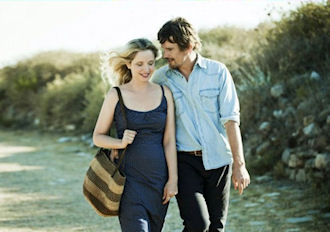 Before Midnight primarily focuses on the end of a six week vacation Jesse and Celine are spending in Greece. Yes, they’re now together and have two kids. The events of the previous film lead Jesse to get a divorce and move to Europe, but in doing so he was forced to leave behind his other son, Henry. Jesse now only sees Henry on occasion and his guilt about that gets the narrative rolling.
Before Midnight primarily focuses on the end of a six week vacation Jesse and Celine are spending in Greece. Yes, they’re now together and have two kids. The events of the previous film lead Jesse to get a divorce and move to Europe, but in doing so he was forced to leave behind his other son, Henry. Jesse now only sees Henry on occasion and his guilt about that gets the narrative rolling.
The film is composed of about six major scenes and in these scenes Jesse and Celine will discuss everything. Their past, their future, their kids, their flaws and expectations. Sex, love, death, it’s all in there. And all of it seems to be circling the major issue that Jesse wants to spend more time with his son and Celine is scared of what that could mean for the two of them.
Over the course of the film the emotions and stakes of this conversation continue to rise, which makes Before Midnight feel more weighty than the previous entries. Everything that’s said somehow feels so significant now that the courting is over. These are simply two adults working out their issues. Add a slight tension on top of that and you’ve got something special. One moment you’re contemplating art or masculinity, the next their relationship is on the brink.
That’s derived from three things: the writing and the two lead performances. Everything in the movie feels incredibly rich, real and unscripted when it’s actually anything but (the director and two stars co-wrote). Also, this being their third time around, Delpy and Hawke are so beyond comfortable together you’d swear they’re actually a couple. Linklater’s camera is simply there to capture their electric chemistry, giving the film a consistant vibrancy.
For Before Midnight to basically only be two characters talking, for a third time, and to remain so engaging is a triumph. One can only hope we see Jesse and Celine again in 2022.
Review courtesy of Germain Lussier of Slash Film.
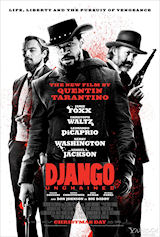
Movie: Django Unchained
Director: Quentin Tarantino
Genre: Western, Drama
Rating/Duration: R, 2 hr. 46 min.
Bold, bloody, and stylistically daring, Django Unchained is another incendiary masterpiece from Quentin Tarantino...
The safest thing one could say about "Django Unchained" is that it finds Quentin Tarantino hurtling over the top yet again by juxtaposing the horrors of slavery with an absurdist, horse-opera buffa plot that quotes from all sorts of movies, including his own, with special emphasis on spaghetti westerns. But the film doesn't play it safe, so neither will I. Instead, I'll say that it finds Mr. Tarantino perched improbably but securely on the top of a production that's wildly extravagant, ferociously violent, ludicrously lurid and outrageously entertaining, yet also, remarkably, very much about the pernicious lunacy of racism and, yes, slavery's singular horrors.
Jamie Foxx is Django, a slave on a Southern chain gang two years before the Civil War. At first Django doesn't have much to do but be chained and smolder with rage. (Eventually that changes with a vengeance when revenge becomes the pivot of the plot.) The star of the movie's early stretches is Christoph Waltz as Dr. King Schultz, a bounty hunter who travels the country in the guise of a dentist, which he once was—his wagon is surmounted by a charmingly ridiculous bobbletooth—until he figured out how to make big bucks. Like slavery, Schultz says, bounty hunting "is a flesh-for-cash business."
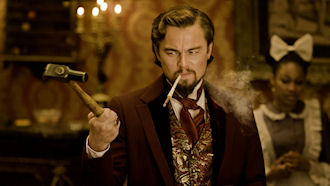 It should be acknowledged that Mr. Waltz is doing a tone-for-tone reprise of Col. Hans Landa, the monstrous Nazi he played in Mr. Tarantino's "Inglorious Basterds." Just as Landa did, the gleefully predatory Schultz deploys lofty language in presenting himself as the soul of sweet reason. He's courtly and cheerful, except when he's being cheerfully bestial. Repetition may be the most shameless form of self-flattery, but it's still good to see Mr. Waltz doing his act again; his elegantly modulated whimsy is one of the wonders of the acting world.
It should be acknowledged that Mr. Waltz is doing a tone-for-tone reprise of Col. Hans Landa, the monstrous Nazi he played in Mr. Tarantino's "Inglorious Basterds." Just as Landa did, the gleefully predatory Schultz deploys lofty language in presenting himself as the soul of sweet reason. He's courtly and cheerful, except when he's being cheerfully bestial. Repetition may be the most shameless form of self-flattery, but it's still good to see Mr. Waltz doing his act again; his elegantly modulated whimsy is one of the wonders of the acting world.
What turns an almost-one-man show into an increasingly tense trackdown-and-revenge thriller is a bargain struck between bounty hunter and slave. Schultz will buy Django, unchain him and eventually set him free if Django, using his hard-won knowledge of the countryside and its denizens, will become Schultz's deputy and help him find three particularly murderous, and potentially lucrative, brothers.
The deal takes the two hunters to a notorious plantation called Candyland, and takes the story into a wickedly astute parody of antebellum drama, with all of its lace and grace and happy slaves. This place is owned by a pretentious fool named Calvin Candie (a deliciously expansive Leonardo DiCaprio), but it's run by a fatefully shrewd house slave named Stephen; he's played by Samuel L. Jackson with surreal jubilance and deadly precision, a huge achievement in a relatively small role. The deal also sets up the movie's most felicitous invention, the revelation that Candyland's slaves include Django's long-lost wife, a German-speaking beauty named Broomhilda (Kerry Washington). Why does Broomhilda speak German? Well, if she didn't, Mr. Tarantino couldn't fold the Siegfried and Brunhilde myth into his mashup, and draw a bitterly ironic parallel between Candyland and Valhalla.
Bitter irony may not sound like the key ingredient in such a free-for-all burlesque. "Django Unchained," which has not one but two blow-out endings, is overlong—energy is lost when the narrative loses track of Django's quest for his wife—and it will surely be too blood-bespattered for many moviegoers. Yet this seriously crazed comedy is also a crazily serious disquisition on enslavement, and how it has been portrayed over the years and decades by slaves to Hollywood. The production was designed by J. Michael Riva, and photographed by Robert Richardson. The cast includes Don Johnson and, in a cameo, Franco Nero, who played a coffin-dragging drifter named Django in an old spaghetti western of the same name.
Review courtesy of Joe Morgenstern of The Wall Street Journal.
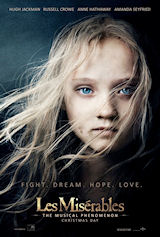
Movie: Les Misérables
Director: Tom Hooper
Genre: Musical & Performing Arts, Drama
Rating/Duration: PG-13, 2 hr. 38 min.
Impeccably mounted but occasionally bombastic, Les Misérables largely succeeds thanks to bravura performances from its distinguished cast...
There’s a moment about 30 minutes into Tom Hooper‘s musical adaptation of Les Miserables where you’re either with it or not. Anne Hathaway, beaten and bruised, hair raggedly cropped short, sings the iconic song “I Dreamed a Dream.” She does so on her own, in a single long-take close-up that lasts at least three minutes. It’s Hooper’s way of telling the audience this film is going to be dark, it’s going to be dirty, it’s going to have emotions, and yes, it’s going to be these actors (who we know better as Wolverines, Catwomen, Gladiators or Mean Girls) singing — and only singing — their hearts out for almost three hours.
In this moment, Hathaway provides one of the most stirring and impressive emotional moments of 2012, perfect capturing the tone and wonder of Les Miserables. It’s mesmerizing, moving and magical.
At its most basic, Les Miserables is the story of Jean Valjean (Hugh Jackman), a man imprisoned for stealing a loaf of bread. After serving a twenty year sentence, he’s released, skips parole and makes a new life for himself. But he’s constantly looking over his shoulder, mostly for Inspector Javert (Russell Crowe) a lawman tenaciously hunting him. Along the way he meets a troubled woman named Fantine (Anne Hathaway) and helps her by raising her daughter Cosette (Isabelle Allen as a child, Amanda Seyfried as a grown up). Eventually, love both complicates and illuminates those characters as the story dovetails with the French Revolution.
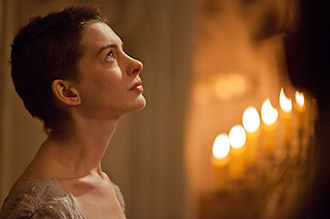 There’s a reason this story, originally written by Victor Hugo in 1862, has endured for more than a century. Every few decades it’s reinvented, most famously and successfully in 1980 as stage musical which became an all-time worldwide classic. The music and lyrics by Claude-Michel Schönberg, Jean-Marc Natel and Alain Boublil are some of the most recognizable and beautiful in all of musical theater. Without the lyrics, the story can be a bit dry. Hooper’s version not only embraces those lyrics, it lives off them. It vibrates from their power from the first frame to last, giving the film an almost kinetic energy.
There’s a reason this story, originally written by Victor Hugo in 1862, has endured for more than a century. Every few decades it’s reinvented, most famously and successfully in 1980 as stage musical which became an all-time worldwide classic. The music and lyrics by Claude-Michel Schönberg, Jean-Marc Natel and Alain Boublil are some of the most recognizable and beautiful in all of musical theater. Without the lyrics, the story can be a bit dry. Hooper’s version not only embraces those lyrics, it lives off them. It vibrates from their power from the first frame to last, giving the film an almost kinetic energy.
That music, the only way the characters communicate throughout, pushes the narrative forward. Act one and two are straight Valjean but act three jumps ahead and the link there never feels quite right. It works, but it’s a bit of a stretch simply because after becoming comfortable with one set of characters, you have to meet and connect to whole other set. This change is a good example of the film’s biggest flaw – it’s almost too big. Everything happens incredibly quickly, save for some of the songs where Hooper and company grind out the emotion, and if you can’t keep up, the film may lose you.
Hooper’s directorial choices won’t help that either. Individually, everything he does works incredibly well, maybe too much so. The close-ups force you to feel the character’s emotions, the wide angle shots give the film a stage play look, the steadycam and computer moves give scope to 19th Century Paris. On their own, these choices come off incredibly brash and exciting. However, being as each look is so different, it stops the film from having a consistent visual style. Everything feels realistic and individually powerful, but the jumping around can be a tad disconcerting.
Those are the only things holding the film back from being a legitimate musical masterpiece. Throughout, the film is bold, brash yet intimate and emotional thanks in large part to the actors giving brave, heartbreaking performances. No one else in Hollywood could have played Valjean like Jackman does. He’s simultaneously sympathetic, masculine, intimidating and kind. Plus, he can sing incredibly well. Russell Crowe’s more stoic performance and voice make for a frightening, but welcome foil to Valjean.
As for the supporting cast, Sacha Baron Cohen and Helena Bonham Carter are hilarious, Eddie Redmayne and Aaron Tveit inspire with their confidence and Samantha Barks is beautiful and nuanced. Up and down the roster, each character is well-defined and somehow relatable. They are the beating heart of Les Miserables, giving it street-level believability.
But it’s Hathaway, in a small but important role, who steals the show right from the start and helps propel the movie to the heights it eventually reaches. Les Miserables is a large-scale, grimy musical that’s both a testament to the talents of the filmmakers but also the strength of the material. It’s a musical worthy of Hollywood history and one of the year’s best films.
Review courtesy of Germain Lussier of Slash Film.
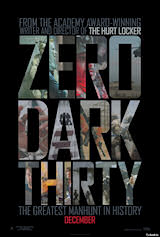
Movie: Zero Dark Thirty
Director: Kathryn Bigelow
Genre: Drama
Rating/Duration: R, 2 hr. 37 min.
Gripping, suspenseful, and brilliantly crafted, Zero Dark Thirty dramatizes the hunt for Osama bin Laden with intelligence and an eye for detail...
The major challenge in telling this particular ripped-from-the-headlines story is underlined by a sequence late in the film. Jessica Chastain’s CIA agent has a face-to-face with a White House aide (James Gandolfini) she needs on side in order to get her inferences about the location of Osama bin Laden acted upon. The aide asks her how long she has worked for the Agency, and learns that practically her entire 12-year career has been devoted to this single target. When he probes deeper, trying to get a handle on why this lonely, debilitating campaign is so important to her, Maya shuts him down. He’s not cleared for any information she might give, even if she were so inclined.
A more conventional movie would have given its lead actress an Oscar clip speech here — about a loved one lost in the struggle, or a commitment to country and cause — but director Kathryn Bigelow and writer-producer Mark Boal remain as tight-lipped as any spook. Chastain’s haunted, intense presence makes a human space in a movie populated by unnamed individuals whose backstories have not been declassified. It’s as pared-down and unjudgmental as any objective documentary, even when Maya’s senior colleague (Jason Clarke) is waterboarding a detainee. Chastain conveys an arc, as Maya goes from flinching in a corner at her first interrogation to dodging bullets when she becomes an assassination target, but moments of character — an analyst (Jennifer Ehle) hoping to sweeten a deal with a defector by making a cake — have to be snatched between the matter at hand.
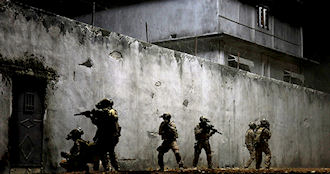 Bigelow and Boal, reteaming after The Hurt Locker, initially planned a film about the CIA’s frustrating, fruitless search for bin Laden, until events overtook the project and provided a last-reel payoff. There’s a structural similarity to a Law & Order episode: the long, set-up act focuses on intelligence-gathering, with a whole new set of characters — the strike team despatched in Blue Thunder-lookalike helicopters to assail bin Laden in his lair — brought on and swiftly established for the climax. The film takes care to endorse no party line. When President Obama (seen only in a TV interview, renouncing the use of torture) puts an end to “the detainee programme”, the CIA simply adjust its tactics.
Bigelow and Boal, reteaming after The Hurt Locker, initially planned a film about the CIA’s frustrating, fruitless search for bin Laden, until events overtook the project and provided a last-reel payoff. There’s a structural similarity to a Law & Order episode: the long, set-up act focuses on intelligence-gathering, with a whole new set of characters — the strike team despatched in Blue Thunder-lookalike helicopters to assail bin Laden in his lair — brought on and swiftly established for the climax. The film takes care to endorse no party line. When President Obama (seen only in a TV interview, renouncing the use of torture) puts an end to “the detainee programme”, the CIA simply adjust its tactics.
We don’t see any political discussion about what to do with the intel gathered by Maya and her colleagues, but we get a sense of the decade-long tangle of scraps of information gleaned from interrogations and surveillance which makes for a mystery that constantly simmers but threatens never to come to the boil. Few films have conveyed the grinding routine of spying as strongly as this — and the way that big targets have to be located by the ripples they leave even as they stay invisible.
Like Bigelow’s The Hurt Locker, it’s a relatively new kind of American patriotic war movie, counterprogramming jaded paranoid fantasies like the Bourne movies or the liberal horror stories (Redacted, Rendition, In The Valley Of Elah, Green Zone etc.) thrown up by the War On Terror. It’s measured, seething with suppressed emotion, unafraid of slow stretches and false trails, snapping shut like a mantrap when blood is shed. If it grips in a more intellectual, journalistic manner than its Oscar-winning predecessor, it’s because Chastain’s character is necessarily absent during the climax — though she has a terrific post-traumatic outburst when the case is closed.
Gripping throughout, with an impressive central performance, this is like a Dogme 95 redo of a Chuck Norris film — by heroic effort, the good guys find and kill a bad guy. How you feel about that is something Bigelow leaves you to decide.
Review courtesy of Kim Newman of Empire.
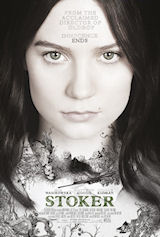
Movie: Stoker
Director: Park Chan-wook
Genre: Drama, Horror, Mystery & Suspense
Rating/Duration: R, 1 hr. 38 min.
'Stoker' Review: A Warped and Hollow Family Portrait From the Director of 'Oldboy' [Sundance 2013]...
The title Stoker suggests vampirism, as a play on the name of Dracula creator Bram Stoker. But the monsters in this film are purely human — people warped into terrible shapes by neglect and jealousy.
For his English-language debut, Oldboy direcotor Park Chan-Wook chose Stoker, a script by actor Wentworth Miller that revolves around a family suffering the pain of change after a significant death. Evie Stoker and her daughter India barely have a moment to come to terms with the untimely passing of husband/father Michael, when his long-lost brother Charlie shows up. Charlie is so long-lost that the rest of the family barely knew of his existence. But it isn’t long before he has insinuated himself into the broken household, and is toying with the affections of lonely Evie and rapidly maturing India.
There’s an influence from Hitchcock – the imposition of a long-lost Uncle Charlie can’t help but conjure thoughts of Shadow of a Doubt — but Stoker doesn’t feel like a Hitchcock film at all. Unfortunately, it doesn’t feel much like a classic Park film, either. There’s lush cinematography to spare, and a strikingly vivid color palette, yes. As a story or character portrait, however, Stoker is resoundingly hollow.
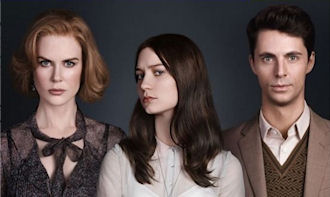 Visually, Park’s film is mesmerizing, all restless camera, carefully coordinated color, and oblique angles. As the camera floats through the gorgeous sets of the Stoker home, guided by Park’s regular cinematographer Chung Chung-hoon, editor Nicolas De Toth cross-cuts between “live” moments, flashbacks, and memory. If there was a story to tell, the visual ideas enacted here by Park & Co might be a beautiful way to tell it.
Visually, Park’s film is mesmerizing, all restless camera, carefully coordinated color, and oblique angles. As the camera floats through the gorgeous sets of the Stoker home, guided by Park’s regular cinematographer Chung Chung-hoon, editor Nicolas De Toth cross-cuts between “live” moments, flashbacks, and memory. If there was a story to tell, the visual ideas enacted here by Park & Co might be a beautiful way to tell it.
But Stoker is appallingly empty, relying on overwrought conversations and endless shots of a silently brooding India. As she broods, Charlie creeps, and Evie preens and sulks. Those actions represent most of the emotional content of the film. Latent conflict abounds — Evie resents the extinguished spark of her marriage, and resents India for becoming the apple of her father’s eye. India resents her useless, pouting mother, and is dealing with the broad rigors of puberty to boot. Telling you what Charlie resents would be to spoil what little surprise the film has.
The film flirts with transgression by strongly developing a sexual triangle between the three leads. But it’s all posturing, and so overplayed that it comes off as weird and silly rather than ominous. Sexy? Forget about it. A relatively explicit solo adventure for India, cross-cut with a bit of violence, should be the point where her development into a proper Stoker family monster is finalized. Instead of being awed or seduced by her adult emergence, I just laughed.
As India, Mia Wasikowska has a commanding stare and imposing scowl. Yet she can’t often crawl out from under Park’s heavy hand, which frequently works to smother rather than support any emotion Wasikowska conveys. Park never lets up; Stoker is style heaped on style, and it’s a rare moment where anything has room to breathe. Wasikowska’s physical performance is quite good, but the film doesn’t seem to care. As Evie and Charlie, Nicole Kidman and Matthew Goode face a similar problem, but fortunately most of what they have to do is lean on furniture and stare.
As concepts, the conflicts built into Stoker are fertile and powerful, but there’s a wild element too many. India has a special power (super-sensitive sight and hearing) which motivates expository voiceover dialogue that India “overhears.” Layer that with Park’s insistent visual sense and a total lack of subtlety with dialogue and theme, and the film collapses under all the weight. There might be an audience that will love Stoker as an ironic, campy freakout, but not me. I enjoyed looking at it — watching the film with Clint Mansell‘s score isolated might be quite nice — but I could never for a moment accept it on its own terms.
Review courtesy of Russ Fischer of Slash Film.

Movie: Lincoln
Director: Steven Spielberg
Genre: Drama
Rating/Duration: PG-13, 2 hr. 29 min.
Daniel Day-Lewis characteristically delivers in this witty, dignified portrait that immerses the audience in its world and entertains even as it informs...
Steven Spielberg's long awaited biopic of 'honest' Abe Lincoln has been in the pipeline for over a decade now, with Liam Neeson set to take on the role before an unlikely turn of events saw him became one of Hollywood's most bankable action stars. Neeson's loss is Oscar-hoarder Daniel Day-Lewis' gain, and it will be of no surprise to anyone that he is absolutely brilliant. Spielberg takes the bold decision to abandon the conventional biopic formula, instead concentrating on a brief snapshot of the 16th President of the United States of America's life. Lincoln focuses solely on the months from January 1865 until his death, in which Lincoln faced a battle to secure his 13th Amendment; the abolition of slavery, and in turn, his legacy.
Spielberg has stated that the film is based on Doris Kearns Goodwin's extraordinary Lincoln biography, Team of Rivals: The Political Genius of Abraham Lincoln, the same book that takes pride of place on the shelves of Barack Obama's Oval Office. Although the narrative of Spielberg's two and-a-half hour movie takes place over the course of one chapter of Goodwin's book, the depth of characterisation and sense of authenticity are hugely indebted to it. Daniel Day-Lewis' extraordinary performance captures every aspect of Lincoln's complex character: the avuncular raconteur, loved by all he met; the single-minded politician, unafraid to manipulate and twist the rules; and the bereaved father, dogged by depression. It is also testament to Day-Lewis that his portrayal of the most iconic and recognisable President is his least caricatured to date. His Lincoln is a far cry from the tour de force performances as Daniel Plainview and Christy Brown that brought him Oscar glory. It is subtle, transformative and alluring; at times, you forget you are watching someone acting and feel as comforted by his rambling stories as the frightened young soldiers on screen.
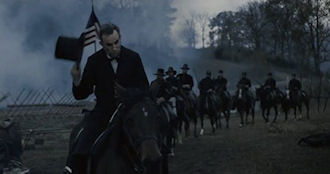 Spielberg's achievement in directing is not overshadowed by the virtuosity of his leading man. The director's preternatural versatility is often overlooked, and Lincoln is perhaps his most intelligent piece of filmmaking to date. It is a master class in restraint, pacing and tone, painting a rich cinematic portrait of a true American hero that is neither jingoistic, sentimental or sensationalist- all things that the great director has been accused of in the past. Those expecting epic Civil War battle scenes in the vein of Saving Private Ryan, will be disappointed. The only battle depicted in this film is a cerebral one between Lincoln and his Democrat opponents, his own party's 'radical' abolitionists, and the explosive mood swings of his bipolar wife, Mary Todd Lincoln.
Spielberg's achievement in directing is not overshadowed by the virtuosity of his leading man. The director's preternatural versatility is often overlooked, and Lincoln is perhaps his most intelligent piece of filmmaking to date. It is a master class in restraint, pacing and tone, painting a rich cinematic portrait of a true American hero that is neither jingoistic, sentimental or sensationalist- all things that the great director has been accused of in the past. Those expecting epic Civil War battle scenes in the vein of Saving Private Ryan, will be disappointed. The only battle depicted in this film is a cerebral one between Lincoln and his Democrat opponents, his own party's 'radical' abolitionists, and the explosive mood swings of his bipolar wife, Mary Todd Lincoln.
Beneath the pedestal of Daniel Day-Lewis, the superbly assembled supporting cast includes terrific turns from Tommy Lee Jones as fervent abolitionist and Congressional leader Thaddeus Stephens, and Sally Field as the volatile First Lady struggling with mental illness. David Strathairn is also brilliant as Lincoln's Secretary of State and former Presidential rival, William Seward- a role that is obviously well studied and researched. However, it is Tony Kushner's screenplay that is the backbone of Spielberg's masterpiece. His script brilliantly captures the theatre of the House of Representatives, with the biting exchanges of rhetoric lying somewhere between Aaron Sorkin's The West Wing and the Coen brothers' True Grit. The film looks beautiful too, with long-time Spielberg collaborator Janusz Kaminski's use of shadows ominously conveying the bleak atmosphere of a nation consumed by war.
Lincoln is a brilliantly crafted character study of one of the world's most fascinating political figures, with a career best performance from the greatest actor of his generation. It's an utterly engaging, intelligent and well-told history lesson from one of the world's finest storytellers.
Review courtesy of Jack Pelling of The Huffington Post.